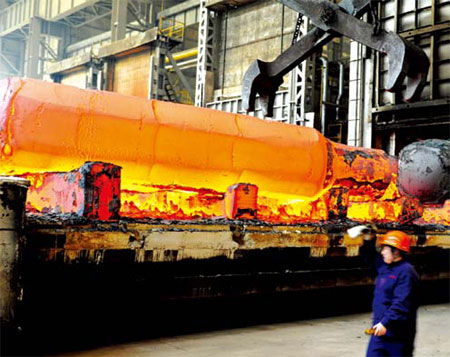Link overcapacity with performance: Experts
Officials should 'take responsibility' for reducing inefficient production
A think tank has suggested that the removal of industrial production overcapacity be used as one of the key criteria to evaluate local government officials' performance as the country steps up efforts to address the lingering problem.
It is much more urgent now than in previous years to solve the overcapacity problem. Big efforts should be made to close some inefficient production lines, even risking rising unemployment, said experts at a forum of the China Center for International Economic Exchanges.
"The function of governments is being transformed by comprehensive reform tasks. Local officials need to take responsibility for reducing overcapacity and facilitating industrial upgrading because that issue has seriously restrained the economy from developing in a healthy way," said Gao Zhi, a researcher at the China Development Strategy Institute for Building Materials Industry.
A plan released by the State Council, China's cabinet, in October targets solving the industrial production overcapacity problem within five years.
"Without mandatory and clear requirements placed on local government leaders, the target will be difficult to achieve," Gao said.
Wen Xianjun, vice-chairman of the China Nonferrous Metals Industry Association, said it is much more difficult to close down inefficient production lines than control the new growth of production capacity.
"The biggest challenge is that unemployment will increase," Wen said. "That is the main reason especially for local governments and State-owned companies to maintain excessive production and try to keep social stability."
The State Council's plan lists five industries that have the most serious problems with overcapacity: iron and steel, cement, electrolytic aluminum, plate glass and shipping.
Experts believe about 20 percent of all the country's urban and rural employment is allocated to those five industries.
After the annual Central Economic Work Conference ended on Friday, a statement stressed the downward pressures on domestic economic growth, one being serious overcapacity in some industries.
It showed the leadership's determination to solve the problem, but a bigger challenge is to balance the conflicting objectives of achieving stable and quality growth, adjusting the economic structure and pushing reform, said Chen Wenling, chief economist at the China Center for International Economic Exchanges.
A report from Fitch Ratings said, "While the Chinese government aims to rebalance economic growth away from investment toward consumption, the changes will take place over a long time."
The agency predicted that investments will remain a major driver of 2014 GDP growth and the fixed-asset investment growth rate is likely to be no lower than 18 percent, which can support the construction activities.
Some traditional industries with overcapacity, especially for building material companies, will benefit from an increase in average sale prices in 2014, Fitch said.
"The stricter regulation of smaller manufacturing plants will pare their overcapacity and benefit leading businesses," according to the report.
chenjia1@chinadaily.com.cn
|
A steel casting facility in Luoyang, Henan province. The iron and steel industries are among those that have the most serious problems with overcapacity. Provided to China Daily |



















